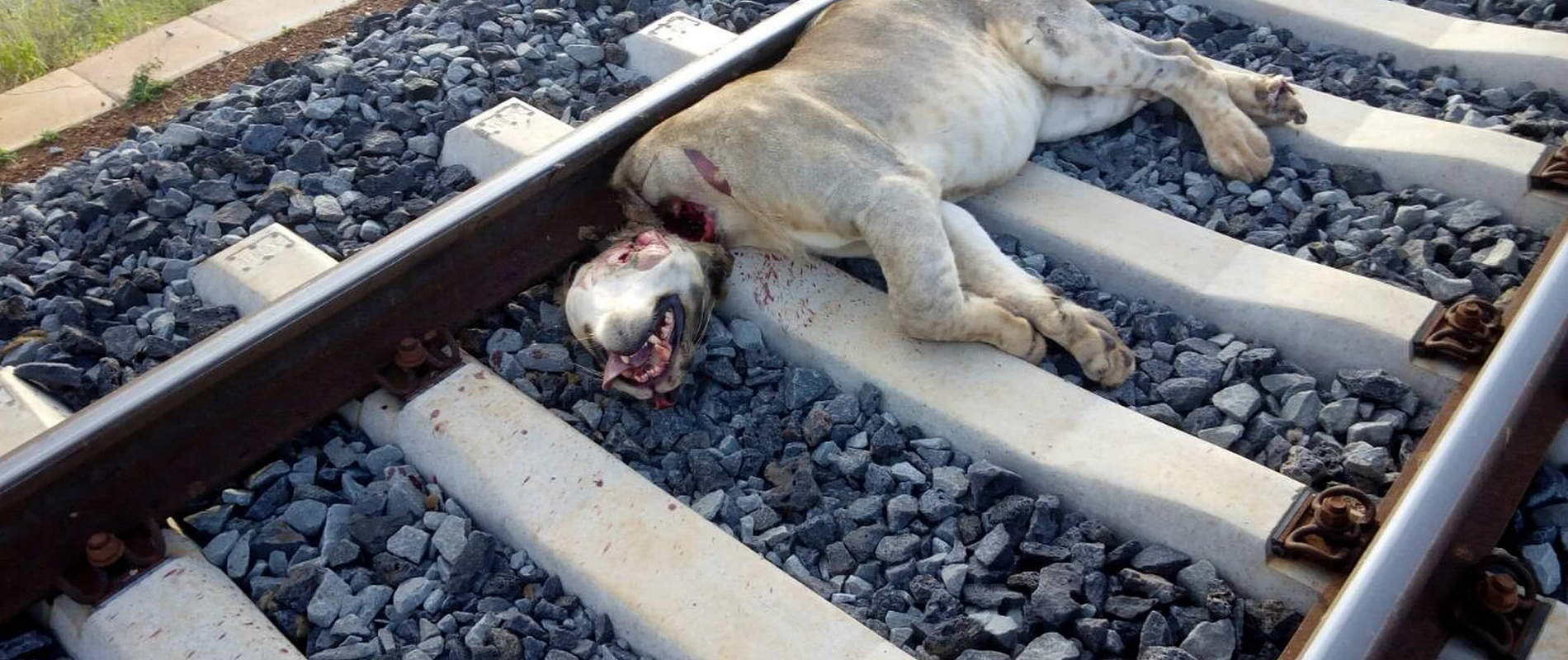VETERINARY REPORT FOR TSAVO MOBILE VET UNIT FOR THE MONTH OF MAY 2018 Reported by Dr Jeremiah Poghon Unit veterinarian Introduction In the Month of May 2018 there was a decrease in rainfall received across the ecosystem with only a few scanty showers here and there
VETERINARY REPORT FOR TSAVO MOBILE VET UNIT FOR THE MONTH OF MAY 2018
Reported by Dr Jeremiah Poghon
Unit veterinarian
Introduction
In the Month of May 2018 there was a decrease in rainfall received across the ecosystem with only a few scanty showers here and there. Generally the vegetation cover remained green with plenty of water at temporary water holes. Cases handled in the month were examination of a Lioness hit by the new standard gauge railway near Maungu, collaring of Lions involved in Human-wildlife conflict in Kuku community group ranch near Chyulu hills and autopsy of an Elephant carcass near Kanderi swamp, all in Tsavo East National Park.
CASE#1 AUTOPSY OF A LIONESS
Date: 5th May 2018
Species: Lion (Panthera leo)
Sex: Female
Age: Adult
Location: Maungu, Tsavo East
KWS rangers reported a lion struck by the new railway near the Maungu trading centre that is adjacent to the Tsavo East National Park. The Vet team visited the site and found the healthy looking lioness nearly decapitated by the accident. It had no chance of surviving the hit and most likely died instantly. Cases of wildlife being hit by the new railway are on the increase despite the fence line erected on both sides of the railway line. There is a need to strengthen the fence along the railway with an electric powered fence to keep wildlife from entering the rail line.
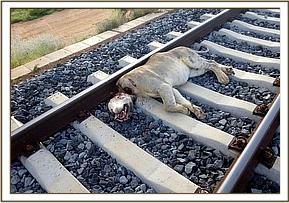
CASE#2 LION COLLARING EXERCISE
Date of intervention: 12th May
Species: Lion Panthera leo (3)
Sex: Male and 2 Females
Age: Adults
Location: Kuku community ranch
History
Kuku ranch is a community conservation area bordering Tsavo West National Park and Chyulu National Park. Human predator conflict is high in the mainly pastoralist community that rear livestock as their main economic activity. There is an increase in livestock predation by wild carnivores in the ranch and this has created a hostile attitude towards wildlife by the local Maasai community. Discussion between the park management, conservancy representatives and the unit resolved to collar the problematic lions for easy monitoring and aid in conflict mitigation. Two Lions (male and female) were mounted with collars and one old collar removed from a Lioness.
Immobilization and collaring
Using night vision equipment the male lion was immobilized using 300 mgs of Ketamine and 4 mgs of Meditomidine Hcl after responding to a calling station near one of the hotspots.
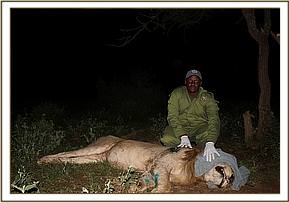
The lionesses were tracked using the old collar which still had its GPS component working. The collars were fitted with enough space to allow the lions to feed and move with ease. The lions were revived one and half hours later using 2.5 mgs of Yohimbine Hcl and monitored until they moved away on their own. Further follow up reports indicate they are doing well with the satellite component sending signals.
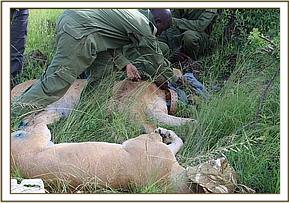

CASE#3 EXAMINATION OF ELEPHANT CARCASS
Date of intervention: 18th May 2018
Species: African Elephant (Loxodanta Africana)
Sex: Female
Age: Adult
Location: Voi River, Tsavo East
History and Examination
The Vet team caught the smell of a decomposing carcass on patrol near Kanderi swamp within Tsavo East National Park and finally located the elephant carcass of a big bull that was fast decomposing. The team examined the carcass to ascertain the cause of death.
The carcass was lying on the right flank and at mid-advanced state of decomposition. There was scavenger activity on the carcass with the tusks still intact. The abdominal contents and the trunk had been scavenged. The skin was removed from the carcass to expose the whitish subcutis and examine any penetrating wounds but none were found. The carcasses were rolled over to expose the left flank and autopsy undertaken with no signs of external injury observed. Tusks were retrieved and taken for safe custody. Time from death was placed at 5 days. The death is from natural causes.
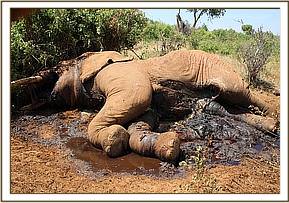
Other activities
- The unit examined several wildlife trophies/parts brought in from Makindu, Voi, Malindi and produced expert reports to aid in prosecution of the offenders in court.
- The vet gave expert testimony in Malindi and Voi courts.
Acknowledgement
The unit acknowledges the support of its sponsors ViER PFOTEN through the David Sheldrick Wildlife Trust (DSWT) for their immense financial contribution to the unit. We also thank Kenya Wildlife Service through the Assistant director Tsavo conservation area and the head, veterinary and capture services department for their support.
